Hesburgh Libraries announce 2023 Library Research Award winners
The 2023 University of Notre Dame Library Research Award competition, sponsored by the Hesburgh Libraries, resulted in 11 awards given to students across diverse disciplines. These annual awards are earned by undergraduate students who demonstrate excellence in research skills by using a breadth of library resources and services for their course assignments, research projects and creative endeavors.
Students from across campus were invited to submit a brief essay describing the many ways in which they used library resources for a project or assignment completed during summer 2022, fall 2022 or spring 2023.
“The annual Library Research Award advances Notre Dame’s mission by recognizing two of the University’s primary goals: to offer a nurturing, unsurpassed undergraduate education and to advance human understanding through scholarship and research that heals, unifies and enlightens,” said K. Matthew Dames, the Edward H. Arnold Dean of Hesburgh Libraries and University of Notre Dame Press. “Building these skills is critical to academic success on campus and in the world beyond graduation.”
Congratulations to the 2023 Library Research Award winners.
First place — Charles House, Romance languages and literatures

Charles House won first prize for his extensive use of library resources while conducting research for his honors senior thesis, “Coproducing Fascism: How Italy and Spain’s Cinematic Cooperation Demonstrates International Fascist Values.” Advised by Charles Leavitt, associate professor in the Department of Romance Languages and Literatures, House was tasked with comparing the similar fascist histories of Italy and Spain during the 1940s through cinema.
“By leveraging the knowledge of subject librarians and the rare and extensive collections of the Hesburgh Libraries, I was able to shed light on an international fascist movement in the cinema industry that has been largely understudied,” said House.
Second place — Tia Williams, management consulting
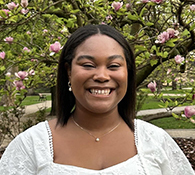
Tia Williams earned second prize for her substantial use of library resources for her senior thesis, “That Which Cannot be Washed Away: A Critical Systematic Review of New Orleans Public Education Post-Katrina.” Williams was advised by Maria McKenna, professor of the practice in the Department of Africana Studies and the senior associate director of the Education, Schooling and Society minor. Williams’ thesis focused on the educational landscape in New Orleans following Hurricane Katrina.
“Beyond this work, these library resources helped me navigate a new methodological approach that will be invaluable in my future, especially as I pursue my Ph.D. in educational research and policy in the fall,” said Williams.
Sophomore, Junior or Senior Award Category
First place — Michael Donelan, history
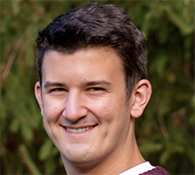
Sophomore Michael Donelan won first prize for his use of library resources to support his research, “Historically Conceiving the Irrationality of ‘Moby-Dick’ through Antebellum America, or: the Apotheosis of Paradox,” which looked at Herman Melville’s landmark work through a historical lens. He was advised by Jake Lundberg, associate professor of the practice and director of undergraduate studies for the Department of History.
“My story and those of others show that, through enabling students, the library is nourishing a love for learning across the nation. It is a force for good in the world,” he said.
Second place — Connor Patrick, history
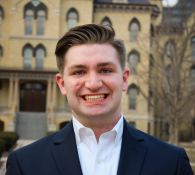
Senior Connor Patrick won second prize for his use of library resources to support his research paper, “Fr. Sorin’s Liturgical Crown Jewel: The Basilica of the Sacred Heart High Altar,” which explored the origins of the religious object. He was advised by Heather Hyde Minor, professor in the Department of Art, Art History and Design.
“Without the resources of the Hesburgh Libraries, primarily those in the Notre Dame Archives but also additional print resources, the discoveries of my final paper simply would not have been possible,” Patrick said.
First Year Student Award Category
There was a tie for first place.
First place — Bernice Antoine, business analytics
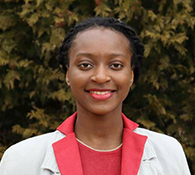
Bernice Antoine won first prize for her use of library resources to support her research paper, “Ultra-Processed Foods through an Intersectional Lens,” which explores the invisible forces that drive underprivileged people to eat ultra-processed foods. She was advised by Whitney Lew James, assistant teaching professor in the University Writing Program.
“The Hesburgh Library is more than a building; it is an embodiment of our commitment to justice through discourse, an encapsulation of Father Ted’s passion for inquiry and, to me personally, a home away from home,” said Antoine.
First place — Carter Powers, environmental engineering
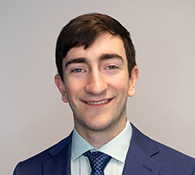
Carter Powers also won first prize for his use of library resources to support his research paper, “Self-Debasement and Westernization: Yu Dafu and the Development of China’s National Identity.” He was advised by Xian Wang, an assistant professor of East Asian languages and cultures and fellow at the Liu Institute for Asia and Asian Studies.
“Overall, I used the library’s resources to find reputable sources that greatly enhanced my ability to write a nuanced argument about the historical, social and political development of China and Chinese literature during the New Culture Movement. Without library resources, my research would have been more shallow and broad and my argument would have been less compelling,” said Powers.
Group Project Award Category
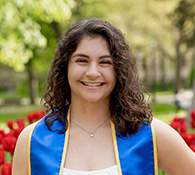
Rachel Salamone, political science
Piper Shine, psychology
Seniors Rachel Salamone and Piper Shine won honors for demonstrating excellence in their use of library resources and services for their project, “Women’s Boxing at Notre Dame,” which focused on Baraka Bouts, a women’s boxing club that has existed for more than 20 years but has little written history. They were advised by Katherine Walden, assistant teaching professor in the Department of American Studies.
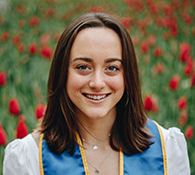
“The Hesburgh Libraries archivists were incredibly helpful; their knowledge, support and excitement for our project proved to us that scholarship can take many different forms, exist over several platforms and can be far more wide-reaching than it may seem at first glance,” the pair said.
Digital Scholarship Award Category
The Navari Family Center for Digital Scholarship (NFCDS) Award is a specialty category of the Library Research Award. This award recognizes excellence in leveraging digital scholarship resources, tools and methodologies in research and projects. Students can win the NFCDS Award in addition to another category or as a stand-alone recognition.
Megan Hilbert, environmental sciences
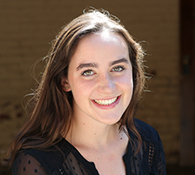
Megan Hilbert earned an NFCDS Award for her use of digital scholarship resources in her research papers, “Understanding controls on ammonium-N removal and reach-scale nitrification using experimental streams” and “Monitoring high-risk areas for agricultural impacts on stream water quality: A case study of the Michiana area,” advised by Jennifer Tank, the Galla Professor of Biological Sciences in the Department of Biological Sciences.
“I could not have accomplished any of this work without the resources provided by the Hesburgh Libraries and NFCDS, and I am extremely grateful for the study spaces, printing resources, databases, computers and GIS platforms that allowed me to produce an honors thesis and develop skills in R and GIS,” Hilbert said.
Joseph Jegier, philosophy
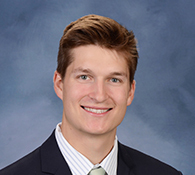
Joseph Jegier earned an NFCDS Award for his use of digital scholarship resources in his senior thesis, “Exploring, Deciding, Becoming; Discernment at the University of Notre Dame,” which looked at student reflections from the Moreau First Year Experience. He was advised by Maria McKenna, associate professor of the practice for the Department of Africana Studies and Education, Schooling and Society.
“The library’s resources, collections, spaces and staff make the library a truly remarkable place. I am grateful for all that the Hesburgh Libraries has done to enhance my intellectual development, and I am particularly appreciative of the role it has played in creating an informative senior thesis,” Jegier said.
Kayle Liao, economics
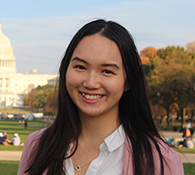
Senior Kayle Liao earned an NFCDS Award for her use of digital scholarship services and resources while working on her honors senior thesis, “Does Political Pressure Affect Monetary Policy?” Advised by Eric Sims, professor and chair of the Department of Economics, Liao’s research focused on evaluating the effect of political pressure on the Federal Reserve.
“My thesis journey was not only a demonstration of my intellectual curiosity and interdisciplinary understanding but also a testament to the Hesburgh Libraries’ excellent staff and services,” Liao said.
Originally published by at news.nd.edu on May 25, 2023.
Latest Research
- From reaction to resolution: The future of allergy treatmentTwelve-year-old Lauren Eglite was thrilled to attend a Notre Dame football game with her father, Erik, in 2017, even though her acute peanut allergy demands constant vigilance. She was even more excited when the stadium’s brand-new video board aired an NBC Fighting…
- New Study Highlights Mother-Child Link for Anemia in The GambiaAnemia is a "silent epidemic." It affects nearly 2 billion people globally, yet many people ignore its symptoms. Typically caused by the consumption of iron-deficient foods, anemia develops gradually. Its symptoms—such as fatigue, weakness, and shortness of breath—are frequently dismissed or misattributed.
- Megan McDermott joins ND–IBM Tech Ethics Lab as new Notre Dame directorThe Notre Dame–IBM Technology Ethics Lab, a critical component of the Institute for Ethics and the Common Good (ECG) and the Notre…
- Jenkins Center for Virtue Ethics receives grant to advance love-based ethical frameworkThe University of Notre Dame has received a $10 million grant from the John Templeton Foundation to support a project titled Love and Social Transformation: Empowering Scholars and Social Innovators to Develop the Love Ethic.
- ND-GAIN releases latest Country Index updateThe lastest update to the University of Notre Dame’s Global Adaptation Initiative's (ND-GAIN) Country Index is now live. The ND-GAIN team will release a second Country Index update in late Fall, which includes…
- In sub-Saharan Africa, 1 in 6 cancer medications found to be defectiveSerious quality defects were found in a significant number of cancer medications from sub-Saharan Africa, according to new research from the University of Notre Dame.












